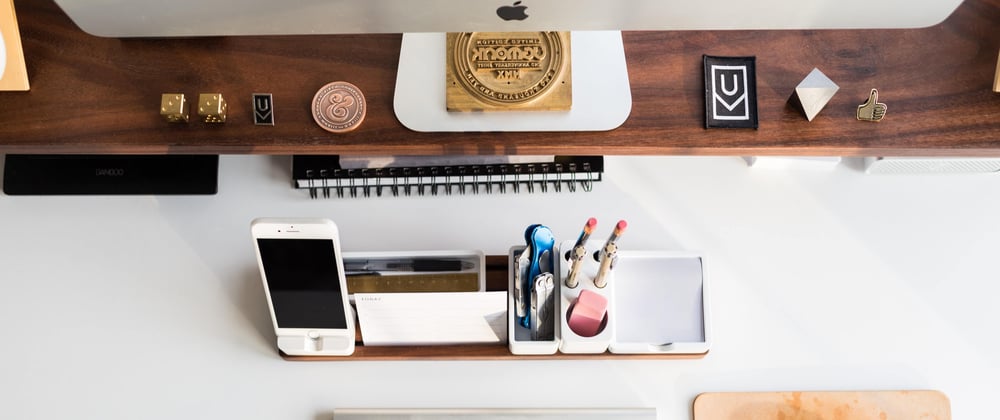Photo by Jeff Sheldon on Unsplash
Due to the latest news and the changes in our lives due to COVID-19, we all had to find a healthy and productive way of working. Many have been sent home and can continue doing remote work, but the "art" of remote work is not just about staying at home and trying to be as productive as possible, there is a whole range of techniques and best practices that can make you super productive without getting tired or exhausted.
The whole idea came up when some people asked me how I can get organized and not freak out doing articles and publishing content weekly, in addition to dealing with other issues like communities and events. It seemed exaggerated to me because I didn't see it the same way – until other people started asking questions too – so I realized that this was a topic of interest to the community at large! So I decided to write a little bit of what I do in the hope of helping everyone who reads!
Summary
- Summary
- Objective
- My History with Personal Organization
- Why Personal Organization Matters
- Difficulties of Personal Organization
- Initial Tips
- Finishing off
Objective
The purpose of this series of articles is not to be a bible to be followed to the bone, but rather a set of practices and tips that I ended up collecting and organizing over the years. I intend to separate these articles in 3 parts so that they are quick and easy to read:
- The first part (this one), we will talk a little about the psychology of personal organization and introductions on advantages and best practices
- In the second part, will be about items that need to be organized, the tools that I use and that I have already used along with some tips and tricks
- Finally, in the third part, we will talk about methodologies, we will also go through some insights that I had over time and how they applied to me, and also how we can combine the best of each methodology and concept and create our forms of organization, after all, it is personal
Note: This article is totally based on my personal experiences, so I may be missing out or leaving out some things because I just haven't lived them. Besides, all the tools that I will quote and leave throughout the next parts of this series and the opinions about them are completely mine based on my use and my experience as a whole. If you have had a different experience or have a different view on personal organization, I would love to read about it in another article or right here in the comments: D
That said, let's move on to the content!
My History with Personal Organization
For those who don't know me, my name is Lucas Santos, I currently work at Microsoft as Cloud Advocate, but I've been working with technology and development for almost 9 years, but why am I saying this? Because I want to show where my idea of a personal organization comes from and why I think it is very important.
During my career I have held various positions in various areas, from support to leadership and, during the period that I have been in all of them, I have never worked only with development. In other words, my work was never my only job, I am and was always very involved with development communities, events, meetups, teaching programming, articles, videos, podcasts and all that while I had to manage my personal life.
Since I was little I was always a very anxious person, I was always very curious to find out how things worked and I always wanted to have control of everything in my hand, I had to know the whole process of things to be sure of what it did, it gives me a feeling of security, of knowing where I'm standing. During my elementary and high school, this was never a problem, but when I got to the job market and college, it started to prove quite impracticable... It is easy for you to know everything in a small company, but when things start getting big, it is out of your control, and trying to regain full control of everything is like trying to hold a moving train with your own bare hands.
And, of course, I believed I could hold the train...
So, between 2016 and 2017 I had one of the biggest stress peaks I've ever had in my entire life, having to manage my college (at that time studying UFABC) and also my job, which had recently moved to a location in São Paulo called "Vila Olímpia", which is far away from my home and public transportation to get there is a pain. This was one of the most difficult tests I had to pass because it took me almost 2 hours to get to work, I woke up every day at 5:40 am and went straight from work to college returning at 11 pm. So I needed to find a way to organize everything I needed to do, study for exams and my hours of sleep and leisure. I failed miserably... In the same year, I had several health problems and several anxiety attacks that made me take one anxiety pill a day until today.
From this point on I started to realize that it wasn't the volume of things I did or didn't do, but what I thought of them, I always thought I didn't do enough and that I wasn't getting where I wanted to go, that's where that I realized that the problem was not me, but my lack of organization. And since then I have tried to evangelize personal organization to as many people as I can so that no one has to go through the same problems that I went through.
Why Personal Organization Matters
Firstly, because it helps to reduce (if not eliminate) your anxiety about seeing things done - we'll talk a little more about that in another section - and this is great for your health because it avoids a lot of problems that anxiety can cause. Once you know that you can relax because things are planned and, if you follow your plan, everything will be ready when it should be.
Then, everything in life requires organization and planning, from the smallest things like your hamster's birthday to large and complex problems like distributed systems using Kubernetes with AKS. So you will have to organize yourself to do everything in your life, is it an obligation? No, you can just go through the tasks one by one and do it in the order you want, storing everything in your mind, but eventually, it will end up weighing and discounting this weight on you.
Last but not least, getting organized is a way of doing more things in less time, so it could be that those 5 things you were planning to do for a week can all be resolved in parallel in 2 days, and then you have 3 days to do other things. Also, getting organized includes not only having your work organized but also your personal life and your leisure time, yes! Leisure is as important as any article or project you are going to do in your life, and it needs to have time in your agenda at any cost, but if you do not organize it will always end up falling to the last priority and then we will come back for anxiety again.
Advantages of Personal Organization
Let's summarize what we talked about in small topics, what are the advantages of personal organization?
- Reduces anxiety and stress by not having control of things
- Creates a growing organization mindset that allows you to extend your organization psychology to other areas and other people
- Increases your efficiency, enabling you to do more things in less time
- Free up time to accomplish more things and, consequently, have more time for you
- Creates healthy organization and filing habits that allow you to search and find things much faster
- Generates responsibility
- Induces self-control and discipline
Difficulties of Personal Organization
Getting organized is not a simple task and therefore takes a long time. Personal organization goes far beyond calendars and task lists, we have to create habits - it was already proven that a new habit takes at least 21 days to be consolidated - also we need to create discipline, avoid procrastination and a lot of other things that involve not only mental but also a physical change.
We have a series of actions that can undermine our personal organization and we don't even notice, for example:
- Procrastination, the act of leaving something to be done later when there is no punishment for not performing a task
- Mental tiredness
- Physical tiredness
- Lack of prioritization
- Lack of definition in tasks
- Problems with self-discipline, after all, not all people can organize themselves to the point of creating discipline and taking people seriously
And a lot of other stuff.
Let's make it scientific and see how our brain works.
The Psychology Behind Personal Organization
The brain is an impressively complex computer full of secrets that we have yet to discover. However, we managed to create analogies very similar to computers. As much as we have a series of tasks running at the same time on your personal computer - mine, for example, now has a browser, the editor where I am writing this article and some communication apps - everything seems to be running at the same time, but in fact, the processor is switching between tasks very quickly, that is, essentially it is running only one task at a time.
The same is true of our brain, although it appears that we can perform several tasks at the same time, the brain can only perform two cognitively complex tasks simultaneously. So many people think that the act of multitasking is beneficial and efficient when, in fact, it is more harmful than beneficial. A classic example is trying to talk on the phone while typing something different, or else, writing an email while talking to someone about another subject, this is because the channels that process the speech are the same and there is only one of them. And that explains why we can tie a knot or play a song and sing at the same time because the voice and the motor channels, that are going to be responsible for the movement of the strings, are different.
When we do this unconsciously we call it task switching, otherwise, we call it cognitive shifiting.
Besides, there is a concept called attention span which is the measure of time that a human being remains focused on a particular task. Microsoft Canada published a study in 2015 which says that the average time that a human being remains attentive to a task is approximately 8 seconds. And this is super important for what we are going to talk about next.
Obviously, this can change according to the type of task we are doing. Apparently, when a task is motivating or pleasant we can have up to 20 minutes of attention to it. And why is this important? Simply because we now have a time limit that our tasks must have to stay efficient and organized, that is, we cannot create tasks that exceed 20 minutes, which forces us to break large tasks into smaller tasks and that by itself, it forces us to detail everything we do, creating a better description of what we need to do, eliminating useless tasks or ridiculous items that may seem important at first glance.
And that is the first step towards personal organization: Know exactly what you need to do
When you have a cloudy task or that does not seem very explicit, you simply cannot develop that task on time, so it will be necessary for you to create another task just to be able to think better about this first one, that is, a task for the planning of the next task, which was exactly what I did in this article, I wanted to write content about personal organization but I didn't know where to start, so for two weeks, I leaned over it and researched possible topics I could talk about and write about, always taking notes all.
Since I'm Brazilian, my organization notes are in Portuguese, but you get the point...
Initial Tips
As we have two more parts of this article, I will not put all the ideas and tips in one place, but I will leave each one in its proper article to make things more organized.
For this article, I will focus more on the discipline part and as we can start to organize ourselves as people, I will not talk about tools, methodologies and any other type of technique, everything I will talk about here is based on what I have experienced throughout the years.
No half words. Always know exactly what needs to be done
Have your tasks very well defined to the very small detail. "Talk to John" is not a well-defined task, you need to make extremely clear everything you need to do, with as much detail as possible, for example, "Talk to John about the insurance policy and ask for the payment to be sent on 23rd".
Your brain is not an HD, it is not reliable
Do you remember what you were doing at this very moment 3 years ago? No? So, this is where I want to get to. Our memory is unreliable, always note down everything AT THE MOMENT YOU THINK OF IT, do not wait until later and never say the phrase "Later I'll write this".
Always write everything down in as much detail as possible somewhere to get it out of your brain. One day I talked to a friend, William "PotHix" Molinari - who is also a developer on one of the organization tools I like most - and he gave me one of the coolest tips: "Your brain is made to process, not to memorize, so take everything you need to remember it and put it in another more reliable channel, like paper".
Be Disciplined
It is not because we are talking about personal organization that we have to take it as if it was a joke, quite the contrary, personal organization is highly guided by self-discipline and responsibility, so you need to take it as part of your job.
Some people have a hard time turning something personal into a responsibility, because, after all, nobody is going to fight with you or pull your hair out because you missed or delayed a personal task, you are your own manager. But this is both good and bad, mainly because you need to be hard on yourself to be productive and efficient, remember, the only person to blame for your failures is you and no one else.
Therefore, the discipline in studies, small and large tasks is only yours, and you need to be hard on yourself, create punishments: "I will not see my series today because I have not completed my tasks", "I will turn off the Internet because I delayed this task ".
EVERYTHING is a task
We'll talk about this later, but everything can be considered a task, from cleaning the leaves in the garden to world peace, so write down everything you need to do and make extreme use of to do lists, don't be ashamed to ask friends to send invites for the Sunday barbecue, live by the principle: "If it's not on my calendar or in my to-do list, it doesn't exist"
Keep it Simple
We just talked to write it all down, but it's no use just putting a task with the title "Achieving world peace", we will talk more about it in the future, but always try to break big tasks into small tasks, usually 20 minutes or less, this way you'll always know what to do.
Everything has a deadline
I'm a programmer, I hate working with deadlines because I want my system even more robust and more perfect, but unfortunately, for our lives, everything needs an end date. All tasks created need to have a date and/or time to finish, if you don't finish by then, you have failed the organization and need to rethink how you are organizing yourself.
It takes a while to understand your rhythm, for example, I am a human amoeba before 9 am, so I know I will not be able to complete anything very complex before this time, so I put on the most complicated and demanding tasks greater cognitive load for after midday, before that I perform minor tasks such as: replying to emails, reading some articles I have on my read list, watching some YouTube lesson, organizing folders and files, etc.
Grow beyond your fear of the future
This goes beyond the personal organization of tasks, but the big problem is that we think we will use something in the future and we end up keeping them - I have a folder full of floppy disks here, which I keep only because of sheer nostalgia - but professional organizer Mia Lotringer showed in this excellent article a very interesting way to organize yourself physically and virtually with your files:
- Overcome your fear of throwing things away or deleting files
- Put everything you think you will need in the future in a box with a destruction date, usually 6 months from the current date
- If you need to take something out of there and use it before this final period, take this thing out of the box and put it in another box with a longer destruction period, 1 year for example
- If you need to take this item out of the 1-year-box again, then keep it, because you are using it for real
- If not, when the date arrives, throw everything in the boxes away
Do have a place to organize your tasks
We will talk about tools and software in the next articles, but for now, always have a place to write down and get your tasks ready, with dates and descriptions. It can be a notebook, a calendar, a planner (which I never understood how to use), whatever, because the most important thing is not the medium, but the habit.
You can write everything down on bread papers, as long as you look at them daily, that is, as long as you have the habit of looking and doing your tasks every day, no matter where you leave them, but remember that we take at least 21 days to create habits - I will leave some tools that help in creating habits in the next articles - so this period needs to be forced on your mind and your actions.
Organize Physically
Everything I'm talking about here seems to be linked to tasks and things to do, but your workplace and your physical things must be organized, nobody can do anything in a very cluttered environment because it creates a very large visual pollution that it ends up distracting your mind.
Focus, strength, and faith. But mainly focus
Have focus on the things you are doing and, for focus, I say: Do only one thing at a time. Don't try to embrace the world and do 5 things at the same time, choose one task, do it to the end, then go on to another.
Small tasks right away!
If you have a task that takes 2 minutes or less, to send an email, answer a person, ask for information, change something. Do it instantly, these tasks don't even have to be on your to-do list, just do them as soon as you think about them.
This is an exception to the previous note where I put that everything should be on the list. Because the time it'd take for you to write a small task on the list is the same amount of time you would take to finish the said task.
Finishing off
I will not go too far in this part of the article because we will discuss a little more about the best forms of organization, methodologies and other ideas in the following article! (which is already planned and organized).
Have you seen any errors, do you have any suggestions or criticisms? Leave your comment here! Or send me a message on my social networks! Any feedback is welcome: D









Top comments (9)
Great article!
But
First you say, consider everything as a task and finaly you end up with "you do not even need to put tasks that take less time on your todos"
What is the matter?
Great question! The point is that I do consider everything to be a task, but not all tasks need to be noted on to-do lists, this is because it doesn't pay off since the amount of time you'll spend putting the task in the list is the amount of time you'll need to do it.
It's an exception
Yeah agree!
I made a change over there to better explain it :)
Thanks for the question!
This is a great ARTICLE!
I wrote down in my 📓Todo to read the upcoming issue.
:)
Thanks
Thanks for this article ...
Great article!
خرید قالب وردپرس
قالب وردپرس
themeoff.ir
Hi Lucas, hope you are safe and doing good. I fell in love with this article of yours
When can we see the part 2 of it being published?
Hello! I'll be publishing it this week on FreeCodeCamp! Stay Tuned on freecodecamp.org/news
Some comments may only be visible to logged-in visitors. Sign in to view all comments.